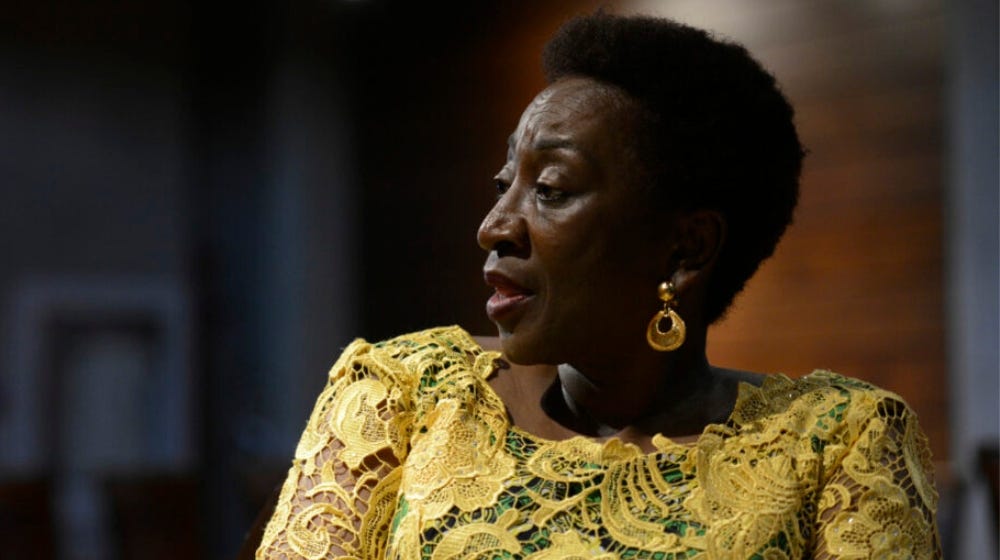Gender seen from Africa
A vision from Oyěwùmí
In a context where feminist debates are becoming increasingly complex and diverse in voices, revisiting the foundations on which these discourses were built becomes an urgent task.
It was with this critical and restless spirit that I came across the article by Nigerian sociologist and professor Oyèrónké Oyěwùmí, whose sharp perspective on the limitations of Eurocentric feminism led me to choose it as the starting point for this review.
The text, titled “Conceptualizing Gender: The Eurocentric Foundations of Feminist Concepts and the Challenge of African Epistemologies”, is part of the collection Feminist Thought Today: Decolonial Perspectives, organized by Heloisa Buarque de Hollanda and published by Bazar do Tempo in 2020.
The book brings together more than 22 researchers who, from Latin American and African perspectives, as well as Black feminisms and ecofeminisms, question Western concepts of gender and propose new ways of thinking about the world.
Oyèrónké Oyěwùmí is recognized for her fundamental contributions to gender and feminist studies, especially for challenging the Eurocentric centrality of these discourses. Throughout her career, she explores the intersections between gender, culture, and colonialism, proposing an approach that values African epistemologies.
In her article, she anchors her analysis in Yoruba culture to question the foundations of Western feminist thought—particularly gender concepts that, according to her, ignore or distort other cultural realities.
Supported by other African researchers, Oyěwùmí challenges the naturalization of the Western nuclear family model as a basis for feminist theories and advocates for broadening the conceptual foundations to include knowledge from other worlds.
The text is structured in four parts. In the first, which shares the article’s title, the author presents her objectives and lays out her critical perspective on feminist debates. Next, in the section “Gender and the Politics of Feminist Knowledge,” she problematizes the idea of a universal concept of woman, showing how feminist movements are rooted in a notion of gender derived from the European nuclear family. The third part, “The Non-Generalized Yoruba Family,” highlights Yoruba family structures, which do not operate on the same gendered principles that shape Western family structures. Finally, in “Challenges of African Conceptualizations,” Oyěwùmí shows how Western understanding often fails to recognize realities that fall outside of its framework.
From the start, Oyěwùmí points to modernity as the historical process that consolidated male privilege, shaping a hegemonic knowledge structure based on capitalist expansion, colonialism, and European industrialization. The legitimization of the European man as the center of knowledge and reason contributed to the creation of a world structure where gender, power, and knowledge are unequally intertwined.
To understand the human condition—especially in various African realities—it is necessary, she argues, to comprehend this historical and epistemological background. From this context, Oyěwùmí launches her critique of gender concepts.
If feminism claims gender as a category of struggle, it must first question its own construction. For the author, "woman" is not a universal identity but a social construct shaped by race, class, and culture. When the concept is shaped within a Eurocentric logic, it tends to exclude experiences that do not fit the white-Western model of femininity.
Oyěwùmí’s main goal is to add an African dimension to the critiques of the gender concept. To do so, she revisits the foundations of feminist studies and shows how they are based on the notion of the nuclear family—a "gendered by design" structure, composed of a male breadwinner, a submissive homemaker wife, and their children. In this configuration, gender is presented as natural and inevitable. Thus, white feminism, bound to this model, fails to address the complexities involving race and class.
The implications of this structure go beyond the family. Understandings of sexuality, for example, are also shaped within this framework. In white feminism, the mother is automatically associated with the father figure. A woman is, above all, a "wife." Her identity is institutionally subordinated to marriage, which ends up defining her social roles within a binary and hierarchical structure.
As a counterpoint, Oyěwùmí presents the Yoruba family organization, which does not operate based on gender as the primary criterion. Instead, social hierarchy is determined by seniority—that is, chronological age. Names, roles, and social functions can be assigned to both men and women, depending on the situation and context. Unlike gender, which is fixed, seniority is fluid. Roles are situational and changeable, allowing for a more open and dynamic family organization.
This approach highlights the main challenge of African gender studies: to what extent is it possible to apply Western feminist concepts to the realities of the African continent? Oyěwùmí shows how African epistemologies are often distorted when interpreted through imported categories. Each example in the article is an invitation to destabilize the universalism of Eurocentric feminism.
In the end, the author is emphatic: any analysis of Africa must begin from Africa. It is essential to respect local contexts and build knowledge rooted in their own cultural realities—not in colonial molds.
The provocation posed by Oyěwùmí is urgent and necessary: how can we speak of equality, emancipation, and justice if we are still unable to listen to and value other ways of living, thinking, and resisting? Incorporating African epistemologies is not merely a gesture of inclusion—it is a vital step toward reshaping gender studies into a truly global horizon, where many voices speak, with legitimacy, about their own worlds.



